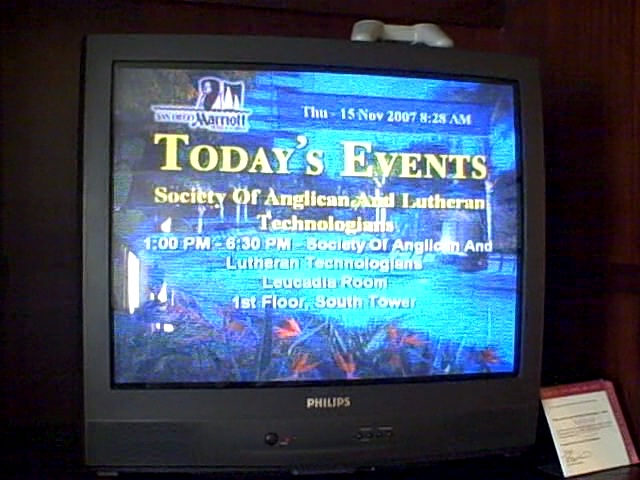Month: November 2007
SALT and Savour
I gave the presentation on Magritte and Krazy Kat at the Society of Anglican and Lutheran Theologians meeting yesterday, and it was a shade of a letdown; the group was attentive and very responsive to the presentation itself, but the preponderance of those who spoke up were pretty firmly committed to the hermeneutical status quo — especially after my presentation, when a panel discussed Lutheran approaches to the use of Scripture in discussions concerning sexuality. Though I didn’t by any means expect that everyone would fall all over themselves to accommodate my points in the talk, many of the pivotal issues in the panelists’ talks fell squarely into the area that I had just devoted ninety minutes to calling into question. Anyway, I’ll post the gist of the lecture in the extended version of this post — in case you’re interested. Continue reading “SALT and Savour”
Ear to the Ground
Our hotel “daily events” calendar lists a meeting of O’Reilly Media today — anyone know whether any of my friends might be hanging around here in San Diego?
[Later: Ah, it’s a “site visit” — no doubt preparing for E-Tech and E-Tel in the spring. Wish I knew who was coming down for the visit though, in case any friends are making a coincident trip.]
Safe Arrival
We got out of bed at 5:30 Eastern Standard Time, and arrived here in our hotel in San Diego at about 5:00 Pacific Time. We’re as worn out as you might think, but the travel went smoothly and we’re only weary, not vexed or abandoned. We’ll go downstairs for a small dinner in a few minutes, then we’ll see if we can stay awake past eight o’clock.
In Summary
Since it cost too much to have a projector for the Society of Anglican and Luthern Theologians (they charge academic theologians the same rates they charge corporations — go figure!), I made handouts of selected images from Magritte and Krazy Kat to illustrate my talk for Friday. Margaret prompted me to provide an outline of take-away points to accompany the images. Rather than paste in the whole durn lecture, I’m posting the emphasis points here.
The proposition: Renounce hermeneutics that posit subsistent meaning as a check on wayward interpretation; adopt a hermeneutic that accepts semiotic abundance.
 René Magritte’s sketches and language paintings undermine the facile assumption that words constitute a privileged domain of subsistent meaning. These works defy conventional premises about how words and images effect meaning.
 George Herriman’s Krazy Kat comics similarly play against conventions about meaning and identity – all the more pognantly when we read them in the context of Herriman’s own life and cultural context. The brick  figures as a pivotal element in the discourse. Ignatz means the brick as an effectual expression of his fathomless aversion to Krazy; Krazy construes the brick as a token of love.
 Hence, I suggest that we treat words not as the archetype of normal communication, but as an exceptional case of the utterly general phenomena of meaning and interpretation. Everything signifies. We ascribe meaning; meaning does not subsist.
 Hence, I suggest that we move from a schema that presupposes a determinate “meaning” that constitutes a discernible property, toward a schema that operates more openly on the terrain of semiotic uncertainty. Think of meaning as a venture, as a gamble; granted the possibility that you may be misunderstood, what can you do to minimize that chance? What stakes ride on your expression?
 Hence, granted that everything signifies, we are caught up in interpretive conflicts and divergent signifying practices all the time. Interpretation is not simply words about words, but it encompasses the lived identities by which we express what matters most to us (and what we don’t care that much about).
 Biblical injunctions to “walk in truth,” “do the truth,” capture this admirably.
 This interpretive mode befits Anglican (and Lutheran?) theology better than does the dominant convention of supposing the existence of subsistent meaning as a check on interpretation. We cannot use the [alleged] truth of a “plain meaning” against our interlocutors; rather, we exemplify the truth so as to make meaning plain to them.
I don’t talk much about signifying practices in the lecture, which is a weakness in a way, since the argument concerning meaning and embodiment relies on the concept of signifying practices for its support, but I only have forty minutes or so to talk. In a more nearly perfect world, the other theologians would be richly versed in what I’ve written on this topic, but I doubt I can count on that in this case.
Now I need to refresh my recollection of Paul Ricoeur, since a respondent to the Reading Scripture book has asked the authors to describe their projects with relation to Karl Barth and Ricoeur. It’s a good question, but my memory’s a bit hazy.
Great Time
Many thanks to the Princeton Emergent Cohort for their generous patience, for helpful questions, for the wonderful phrase “ambient signfication,” and for their encouragement. More later, sleep now.
Beware
Margaret and I will fly to San Diego tomorrow, and she’s printing out boarding passes now. Except I should have couched that in the singular; according to our airline, I will have to check in at the airport. We’re trying to figure out what about me merits this special attention, but at least you all can be assured that our government is making sure that Christian pacifist hermeneuticians pass Homeland Security muster before they board your transcontinental flight.
Mightier Than Swords

I’m generally a union guy, so I would be inclined to support the WGA anyway — but especially since I’m a writer of a sort myself, I wanted to take up the handsome banner that someone over at the WGA Supporters’ LiveJournal page provided and show my support for the Writers Guild (thanks for the pointer, Jeneane!).
I was a little trepidatious about the “Pencils Down,” “Black Tuesday” aspect of the call to arms, since I have a sermon to finish for this afternoon, and it wouldn’t hurt for me to make some progress on book reviews and my Matthew project, but so far I haven’t seen any instruction that says I’m not supposed to write today. I promise that I won’t compose anything for film or video production.
Whoops!
Through a miscommunication, it seems as though all my archives — every link that has ever been made to a previous post that pointed here — all have been obliterated in the transition. I will see what can be done about this.
Later: Partly fixed.
Changes Made
Thanks to Kevin, who was one of the chorus of voices who shouted out in horror when I expressed the intention to switch from Moveable Type back to Blogger. He checked in with me about my design desiderata, humored the stipulation that he honor the Official Color of the Disseminary, and so on; then yesterday and today prepared and installed the new, improved WordPress version of my blog, with comments again! And tabbed back pages! And I’ll put back a blogroll sometime!

And as a parting note, I submit the above blurry photo I took while I was waiting for water in the cafeteria lunch line today. Since you probably can’t read the caption from the photo, I’ll provide it for your bemusement: “We would rather see your soda on the floor then you. Please report all spills immediately.” As Margaret said, “We would rather see your soda on the floor then you, than see you on the floor then your soda on top of you.”
No Pain, No Wordcount
The weekend has passed with a certain amount of writing stress, but I think I’ve pretty much settled the hash of my paper entitled “René Magritte, Krazy Kat, and Truth in Interpretation,” which I’ll test-drive on Tuesday for some Princeton Seminary students with an interest in Emergent Church, and will offer in final form to the Society of Anlgican and Lutheran Theologians on Thursday. I’ll post a synopsis of it here tomorrow, deo volente, with a link to a PDF of the full text.
We Flipped
The fundraiser for Witness.org featured Flip video cameras, evidently the kind of easily portable cameras with which they equip local media activists. We had a chance to fiddle with the cameras during dinner, and I was very, very impressed. Now, along with wanting to help Witness and its Hub “YouTube for activists” website, I think Margaret and I may Flip.
